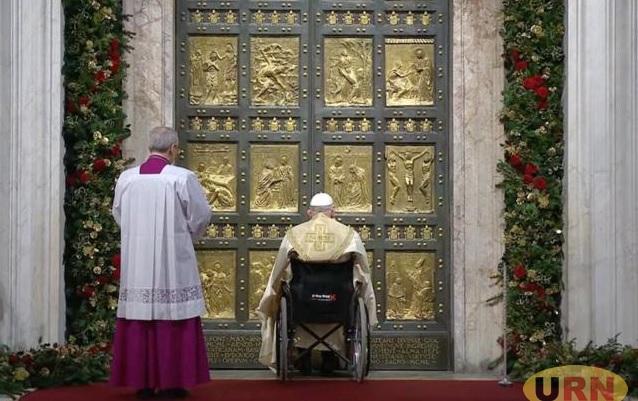
Rome, Italy | THE INDEPENDENT | Pope Francis officially launched the Catholic Church’s 2025 Jubilee Year on Tuesday evening by opening the Holy Door of St. Peter’s Basilica in a ceremony on Christmas Eve. The symbolic act began a year-long celebration, which will run until January 6, 2026.
The event occurred just before the Christmas Eve Mass, the Nativity of Our Lord, and was broadcast to millions worldwide, including an audience in Uganda through Catholic Television. At precisely 9:15 PM Ugandan time, the Pope, who was in a wheelchair and assisted by aides, knocked on the door. Before it opened for him to enter, and paused for a silent prayer. The bells of St. Peter’s Basilica rang joyously to reflect the significance of entering the Jubilee Year.
Following the Pope, a procession of clergy and laypeople, including men, women, and young people from various nations, walked through the Holy Door. Each participant touched the door and made the sign of the cross as a sign of faith and unity. The event is said to have attracted cardinals, bishops, clergy, and over 30,000 faithful from around the world.
Over the next 12 months, pilgrims will pass through the large bronze Holy Door, which is normally closed. By tradition, those who walk through it will receive a “plenary indulgence,” a special form of forgiveness for their sins. This act symbolizes the spiritual renewal and reconciliation that the Jubilee Year invites for all believers.
A Holy Year, or Jubilee, is a special occasion in the Catholic Church focused on themes of forgiveness, reconciliation, and spiritual renewal. These events encourage the faithful to restore their relationship with God, one another, and all of creation. The 2025 Jubilee Year will be celebrated under the theme “Pilgrims of Hope,” reflecting the need for hope in a world deeply affected by war, the lasting impacts of the COVID-19 pandemic, and the ongoing climate crisis.
Traditionally the jubilee is observed every 25 years. This practice has been in place since 1470 when Pope Paul II reduced the interval from 50 years. The most recent Jubilee Year was celebrated in 2000. However, the Pope can also declare an Extraordinary Jubilee, as was the case in 2015 when Pope Francis inaugurated the Extraordinary Jubilee of Mercy.
The 2025 Jubilee Year is especially significant, as it commemorates the 2,025th anniversary of the birth of Christ. Along with the Holy Door at St. Peter’s Basilica, additional Holy Doors will be opened at other major Roman basilicas, including St. John Lateran, St. Mary Major, and St. Paul Outside the Walls. Pilgrims from across the globe are expected to walk through these doors, receiving indulgences and participating in acts of reconciliation.
For those unable to travel to Rome, bishops worldwide will designate local cathedrals or popular Catholic shrines as pilgrimage sites for the Jubilee. These sites will provide opportunities for prayer, reconciliation, and indulgence, strengthening the faith of participants.
In Uganda, Bishop Joseph Anthony Zziwa, the chairperson of the Uganda Episcopal Conference and Bishop of Kiyinda-Mityana, announced that each diocese will prepare a schedule of events for the faithful to participate and mark the Jubilee Year.
Bishop Zziwa also revealed that local bishops will replicate the Pope’s Holy Door opening ceremony on December 29, 2024, to usher in the Jubilee Year celebrations across the country.
In addition to being a Jubilee Year, 2025 holds special significance for Christians worldwide as Easter will be celebrated on the same date across both the Julian and Gregorian calendars. This rare alignment means that Christians in both the Western and Orthodox churches will observe Easter on the same day- April 20.Furthermore, 2025 marks the 1,700th anniversary of the First Council of Nicaea, an ecumenical gathering that established the Nicene Creed. This historic milestone will also be commemorated during the year.
******
URN
 The Independent Uganda: You get the Truth we Pay the Price
The Independent Uganda: You get the Truth we Pay the Price


